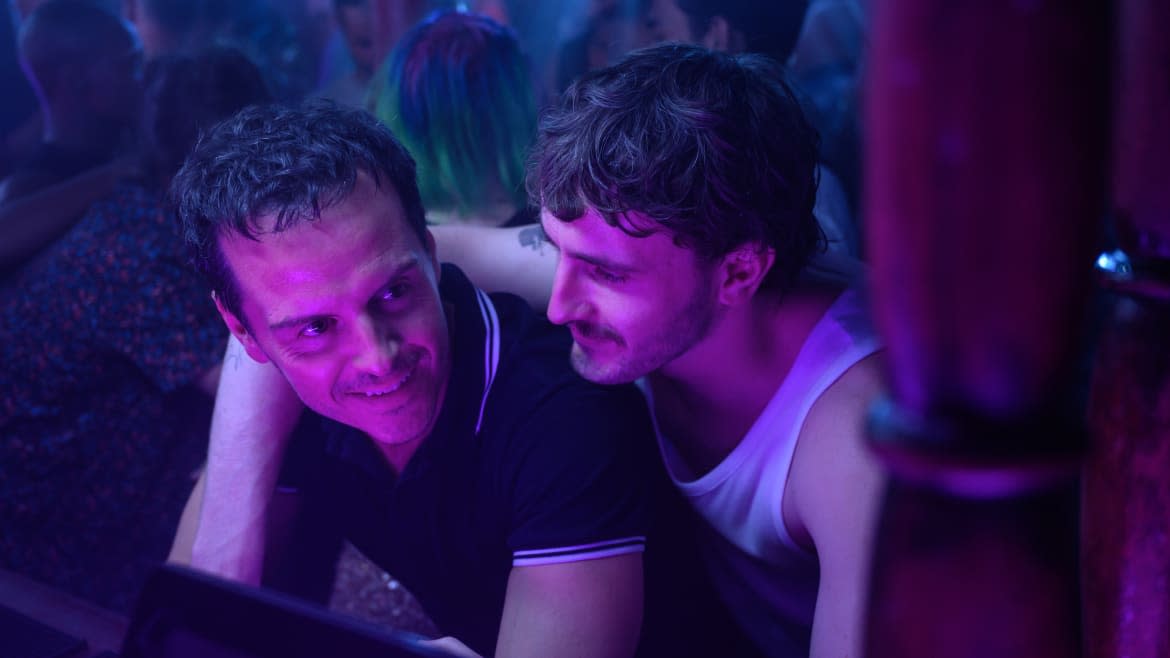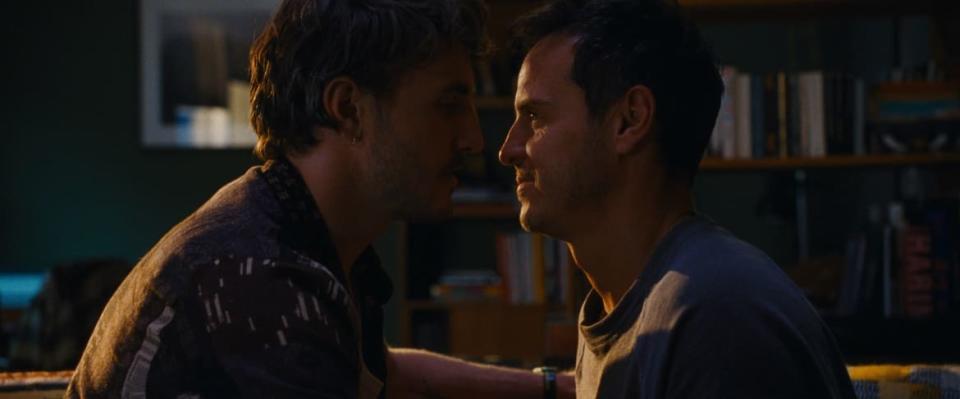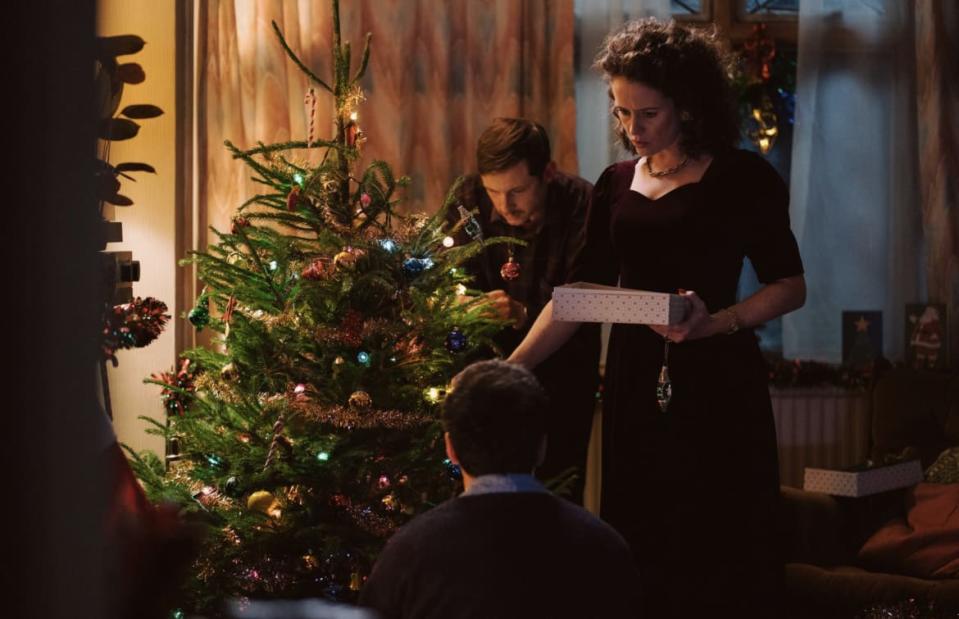‘All of Us Strangers’: Andrew Scott Is Devastatingly Good in Fiery, Gay Knockout

- Oops!Something went wrong.Please try again later.
- Oops!Something went wrong.Please try again later.
Writer-director Andrew Haigh has made a name for himself in the realm of sad, gay cinema. The director’s 2011 breakout hit, Weekend, became a lightning rod for some members of the queer community, with discussion of the film being a go-to icebreaker on first dates—well, at least for me. Weekend, for all of its fans, was a film that never connected with me, no matter how hard I tried. Bringing it up on dates was an effective litmus test for whether or not I might click with someone as a prospective partner. But it speaks to Haigh’s talent as a filmmaker that, although his most beloved feature could never pierce the veil for me, I’ve greatly enjoyed his other work, particularly 2015’s stunning 45 Years.
In the case of Haigh’s latest project, the sublimely emotional All of Us Strangers—which screened Thursday at the New York Film Festival—things are very different. Here, Haigh takes the queer experience and makes it universal; the specificity of gay trauma is merely a catalyst for Haigh’s characters to embark on a journey through their best and worst selves. It’s at those extremes that Haigh crafts his most accessible film yet, a tender treatise on the undying power of love and what happens when we ignore its force.
All of Us Strangers is loosely based on Taichi Yamada’s 1987 novel Strangers, yet has Haigh’s signature touches all over it. I don’t just mean the hot guys, but I am also directly referring to the hot guys. The film stars Andrew Scott and Paul Mescal as Adam and Harry, two neighbors in a recently completed London high-rise who find themselves repeatedly bumping into one another, if only because there aren’t yet many other tenants to crowd the place. One night, Adam opens his door to find a drunken Harry standing in the hallway, asking if Adam would like to have a drink… or whatever else a drink may lead to. Though intrigued, Adam turns him down in favor of burying himself in his work: a screenplay set in 1987, about his parents who died in a car crash when he was just 12 years old.
Eventually, Adam is drawn to Harry, seeking safety and comfort in his neighbor’s company as Adam delves into his past. While the two men grow closer, Adam finds himself reminiscing on his parents even when he’s not working, deciding to visit his childhood home outside the city. There, he discovers his parents (Jamie Bell and Claire Foy) still alive and looking the exact way that he remembers them, waiting and ready to welcome their son back into their lives. It’s here where All of Us Strangers takes a sharp left turn, both for the bizarre and the better.

Haigh has a penchant for asking thorny questions that have equally prickly answers, and All of Us Strangers is no exception. But instead of approaching the complicated dynamics of love and relationships from his typically direct vantage point, Haigh opts to throw his audience headfirst into dreamlike surrealism, asking for the viewer’s trust as he builds an uncharted world for Adam to explore. And while his attempts to meld Adam’s burgeoning relationships—both with his parents and with Harry—don’t always connect so neatly, it’s fascinating to see how much raw feeling Haigh’s screenplay is able to tap.
Adam’s reunion with his parents not only gives him a chance to get to know them once more but to fill them in on everything that they’ve missed. He’s a writer now; they love that. He’s got a sturdy frame and the quiet disposition that they always expected their sensitive son to have. He’s also gay, a fact that both of his parents suspected but could never be sure of before their passing. Now in his forties, Adam is comfortable talking about his sexuality with his mother and father with the freedom that time and the modern age allow. His confidence allows them all to connect on a much more real level than they ever could when he was just a child.
‘Passages’: Why Ira Sachs Made the Horniest Film of the Year
That newfound connection arrives as Adam asks his parents the toughest questions, the ones he never got to ask before but spent his life wondering the answers to. It’s in these scenes where Scott does some of the finest work of any actor this year, ably moving between the stone-faced fortitude of a man who has fashioned his trauma into an impenetrable wall and the kindhearted introspection of a lost child. There’s a familiarity to his performance, one that will slash the hearts of any viewer holding on to something left unsaid. Even when Haigh’s script dips too much into melodrama, Scott doesn’t let Adam become a weepy, gay cliche.
He carries that skill over to the film’s romantic storyline just as well, setting celluloid ablaze with his and Mescal’s crackling chemistry. Adam and Harry’s fledgling relationship, though a bit unconventional at its start, is warm and affectionate—the kind of tenderness that Haigh has relentlessly tried to portray across his body of work. Even the sex scenes, which are second in realistic eroticism only to this year’s Passages, have a resounding sensitivity to them. Haigh is otherworldly when it comes to capturing not only the feeling of falling in love but all of the fear of vulnerability that comes along with it.

It’s when the film examines that fear of heartbreak that All of Us Strangers produces its most effective moments. Toward the start of the film, Harry spies a photo of Adam’s parents, and Adam tells his lover that both of them died when he was young. When Harry tells Adam that he’s sorry, Adam quietly repeats the mantra that so many grief-stricken people do, even after they’ve processed their pain: “It’s alright, it was a long time ago.” When Harry gently responds, “I don’t think that really matters,” it colors the entire film’s narrative. In another writer’s hands, this small piece of dialogue could be entirely forgettable; in Haigh’s, it’s a map to the inner workings of the human psyche, an assurance that it’s alright to never entirely heal.
Mescal gets more than a few of these lovely reflections, building on the kind of subdued sadness that the actor so capably wore on his sleeve in 2022’s Aftersun. While All of Us Strangers is less of a slow burn than that film (here, you’re likely to cry every 15 minutes once things get going), the two movies share a similar abstraction in their final moments. Haigh reaches a stellar and startling climax, one that’s likely to divide audiences but ultimately works given the film’s ambition. It may not be especially clean or concise, but something as cosmic and eternal as love never really is.
Did you like this review? Sign up to get our weekly See Skip newsletter every Tuesday and find out what new shows and movies are worth watching, and which aren’t.
Get the Daily Beast's biggest scoops and scandals delivered right to your inbox. Sign up now.
Stay informed and gain unlimited access to the Daily Beast's unmatched reporting. Subscribe now.

